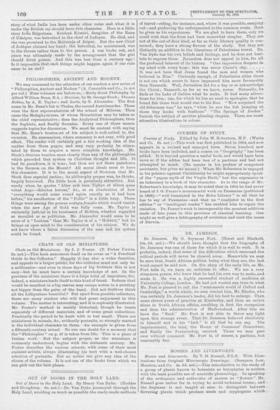PHILOSOPHIES, ANCIENT AND MODERN.
We may commend to the attention of our readers a new series of "Philosophies, Ancient and Modern" ( A. Constable and Co., is. not per vol.)• Four volumes are before us,—Early Greek Philosophy by Alfred William Bonn, B.A. ; Stoicism, by St. George Stock ; Thomas Hobbes, by A. E. Taylor ; and Locke, by S. Alexander. The first name in Mr. Benn's list is Thales, the second Anaximander. These were the first representatives of the school of Miletus. Then came the Metaphysicians, of whom Heraeleitus may be taken as the chief representative; then the Analytical Philosophers, then the Sophists, and finally Socrates. Every one of these names suggests topics for discuss:on. We must be content with saying that Mr. Benn's treatmmt of his subject is well suited to the occasion. He summarises, where summary is not easy, with good effect. The reader will certainly get a fair working idea of the matter from those pages, and may very probably be stimu- lated by them to acquire a more complete knowledge. Mr. Stock's Stoicism touches more closely than any of the philosophies which preceded that system on Christian thought and life. It had its paradoxes, it is true ; but then are not there paradoxes in the Sermon on the Mount? All moral ideals seem to have this character. It is to the moral aspect of Stoicism that Mr. Stock does especial justice; its philosophy proper was, he thinks, largely borrowed. His little book is peculiarly attractive. But surely when he quotes "Alter erit turn Tiphys at snore quae vehat Argo—deloctos heroes," &c., as an illustration of how "everything would come round again exactly as it had been before," his recollection of the "Pollio" is a little hazy. These things were among the priscae vestigia fraudis which would vanish when the new Age of Gold was fully come. Mr. Taylor is eminently judicial in his treatment of Hobbes, whether regarded as moralist or as politician. Mr. Alexander would seem to be more of a " Lockian" than Mr. Taylor is of a " Hobbist," but he brings an open mind to the consideration of his subject. We do not know where a fairer discussion of the man and his system could be found.
























































 Previous page
Previous page